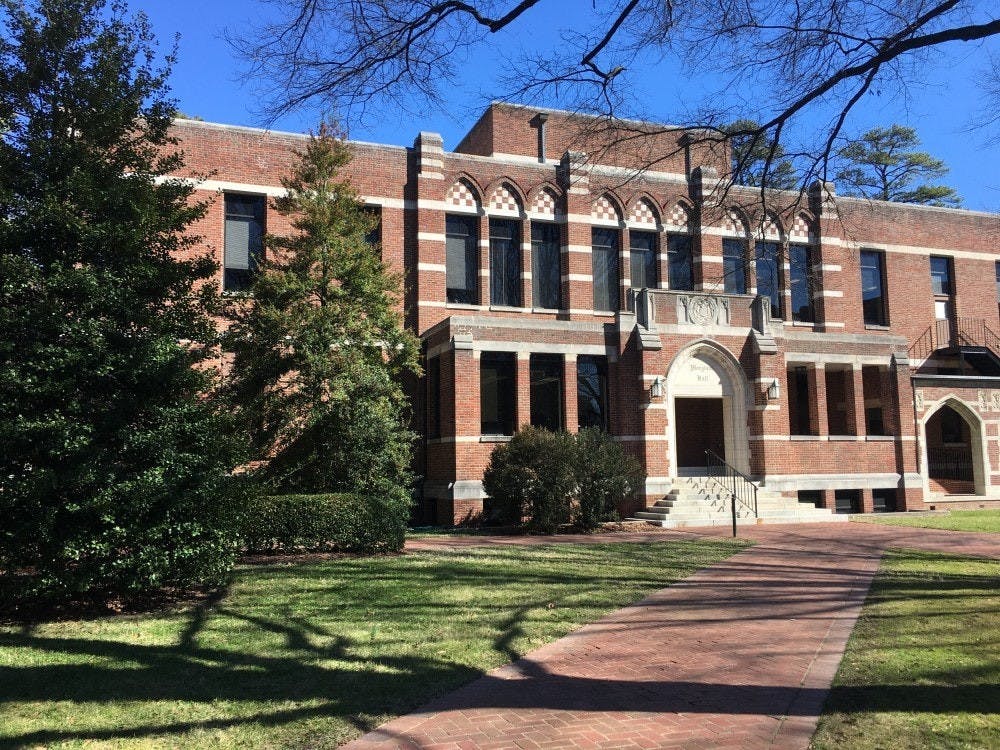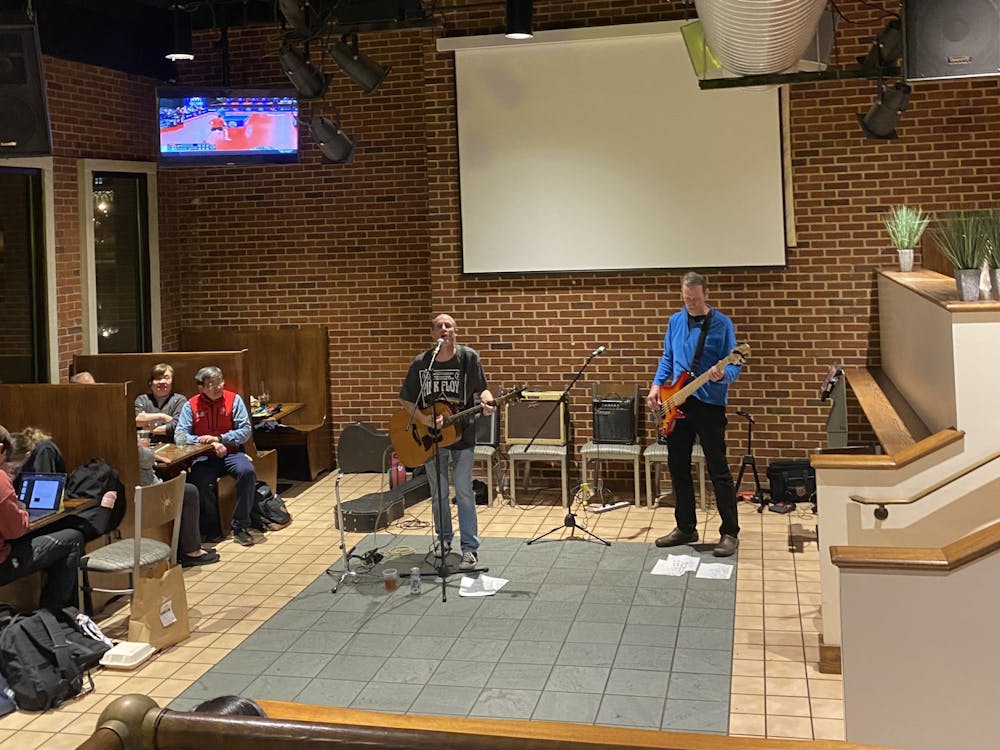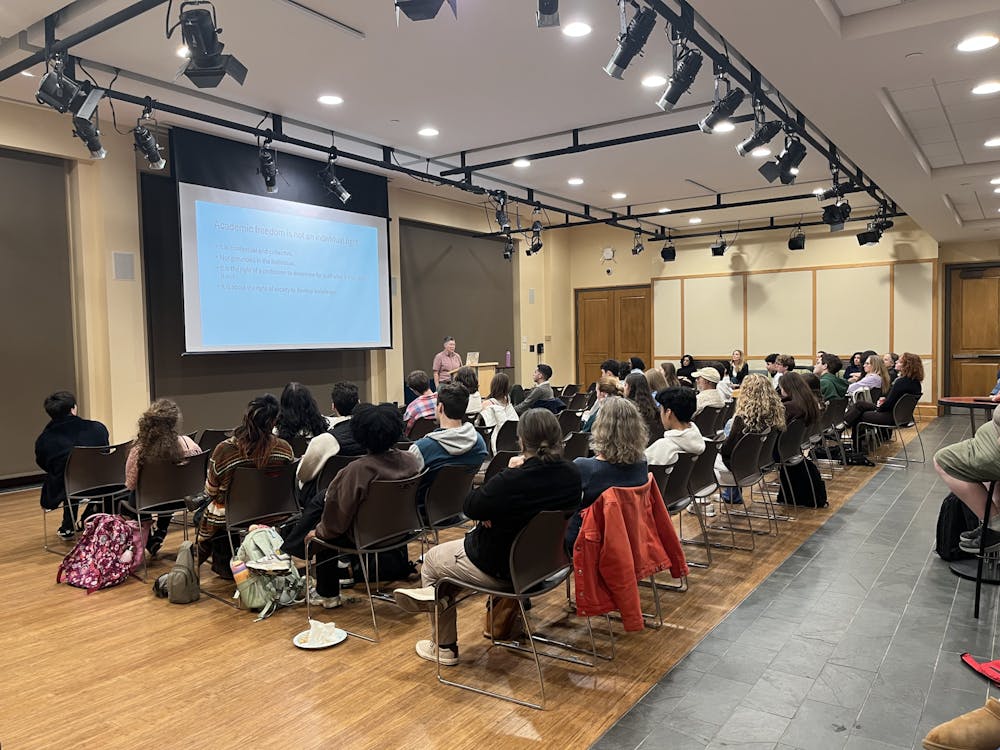Jane Berry, the University Faculty Senate president, withdrew a motion to create a task force on developing an official free speech policy at the monthly senate meeting on Friday, Nov. 16.
The motion that was withdrawn expressed Senate support to President Ronald Crutcher and the provost to create a university task force to explore the issue of freedom of expression at the University of Richmond and make a recommendation to the president and provost of the university after deliberation and discussion.
The motion was drafted in response to sophomore Alec Greven’s Free Expression Resolution.
The resolution calls for university administration to “develop a comprehensive policy on freedom of expression similar to the University of Chicago’s Report of the Committee on Freedom of Expression.”
A copy of the free expression resolution passed by the Richmond College Student Government Association in April 2018. Courtesy of Alec Greven.
Berry withdrew the motion from the floor because she wanted to address concerns and oppositions to the creation of a task force.
“I personally want my constituents of the university to know that I have heard their objections to the motion as stated and their concerns about freedom of expression at Richmond, and so that’s the reason I pulled back,” Berry said.
The intentionally broad and vague motion charged the Office of the President and the Provost to create such a task force because the Senate’s scope of power is limited to academic matters, Berry said. The Faculty Senate agreed that the proper forum to create a task force to discuss what an official free speech policy would look like should go through administration.
“Whether we have a task force, or the first phrase we used was 'working group' in the original motion that got tabled at the last meeting and this one replaces the original motion, we now have the outcome of what some of us have originally envisioned which is a university wide conversation, or several conversations, about these issues,” Berry said.
The Senate discussed the Office of the President hosting listening sessions in the spring that could result in a new motion being brought to the Senate, or the appropriate body if the Senate is not the appropriate body, to create a task force, Berry said.
A university spokeswoman hasn't responded for comment as to whether the Office of the President has planned these listening sessions yet.
“As a point of clarification, there is nothing in the current proposal that prevents the task force from being created," Todd Lookingbill, a faculty senate member, said. "We [the Faculty Senate] were never going to create the task force anyways, so there’s nothing that prevents that from happening."
Enjoy what you're reading?
Signup for our newsletter
There were mixed opinions from the senators about the motion withdrawal. Faculty senate member Noah Sachs said he supported the passage of the motion because he envisioned that a big part of the task force’s job would be to hold listening sessions with various stakeholders of the University.
“I feel like we are stalling, honestly, if we have a year of listening without the creation of a task force...I would rather see that task force created rather than waiting,” Sachs said.
However, some faculty, including Chair of Committee on Committees Jan French, Lookingbill, and Senator Tanja Softic, supported this decision as an opportunity to do more listening and discussing.
In the spirit of listening more, Berry wants to talk to the committee at Colgate University that adopted an official report in support of academic freedom and freedom of expression on campus to discern how they arrived at a unanimous vote to approve such a report.
“I have been in touch with the chair of the Colgate committee…and I had some back-and-forth conversations with him, and he might be able to suggest representatives from Colgate who have experienced guiding these kinds of conversations to come and facilitate our conversations in the spring,” Berry said.
University president Ronald Crutcher supported the withdrawal of the motion because he had concerns about the human resources available to staff and support the task force.
The President's Office has already created the President’s Advisory Committee and the Interim Coordinating Council Diversity, Equity, Inclusion and Thriving this year.
"I want to get, and it has taken a little longer than I would’ve liked, to get to the implementation of some programs to put us on the right path to ensure that all of our students and faculty and staff thrive at the university," Crutcher said. "So I want to get that piece done and finish it [first].”
Crutcher hopes that the momentum this resolution has picked up will encourage the university community to engage with and attend events next semester regarding free speech, he said. University of Chicago president Robert Zimmer is a Sharp Viewpoint Series speaker who will speak on the freedom of expression on campus.
The university is also inviting Zachary Wood, author of the book "Uncensored" to speak upon student petition and a request that was supported by Crutcher. The CEO of Phi Beta Kappa and First Amendment expert Frederick M. Lawrence will also speak on campus.
“We as a community need to have real conversations about these issues, and not just back room conversations or listserv conversations, but face-to-face conservations," Crutcher said. "That’s part of the issue. We want our students to graduate with the tools that will allow them to engage in difficult conversations no matter what the subject is, and to have the inner strength to do that. It’s a complicated matter - we don’t all see eye-to-eye. So we need to have time to listen to everyone’s perspective and to have some community discussion before we even begin putting together a group to think about what we’re going to do.”
These interactions and conversations could drive the consideration of doing something about the resolution at the end of the spring semester or start of the summer due to the amount of initiatives the Office of the President is taking on right now, Crutcher said.
Although inviting speakers to campus is excellent, Greven said, he is concerned that there won’t be results because there is no bureaucratic plan outlining how the resolution will move forward or how the university will take action.
“The important part of that task force is that’s the modicum for having this conversation," Greven said. "If you don’t have a task force, and you don’t have an entity that’s listening, then who’s actually listening? What groups are they listening to?”
Greven said he was not informed prior to the Faculty Senate meeting on Friday, Nov. 16, that Berry withdrew the motion.
“When the motion was withdrawn roughly 15 students walked out of the meeting in protest," Greven said in an email. "At this point, no member of the administration has reached out to me or anyone else in the Senate to address this resolution moving forward.”
The Free Expression Resolution has garnered widespread support from student organizations. The Richmond College Student Government Association and the Westhampton College Government Association signed an Academic Affairs Joint Committee Report supporting the resolution. The College Democrats and College Republicans supported a clear resolution on free speech as a bipartisan issue.
Greven, who is the executive secretary of RCSGA, thought the motion withdrawal avoided the issue and expressed frustration at the inaction on the resolution.
“I definitely agree that we have to hear from many constituents and stakeholders, and I’m not saying that process should be rushed," Greven said. "But like one of the Faculty Senate member’s comments, I don’t think it should be stalled to death.”
Greven acknowledges that the process to adopt a formal policy on free speech is a long one, but the passage of this motion would only be a small starting step to adopting a free speech policy, he said.
Although the future of the Free Expression Resolution is unclear, Greven said he and the resolution’s supporters will continue to work for the development of an official policy.
“What we will do is we will continue to have conversations as we’ve had, we will continue to reach out to people, and continue to press the university as much as humanly possible to address this issue in a timely manner,” Greven said.
Contact senior news writer Nancy Lam at nancy.lam@richmond.edu.
Support independent student media
You can make a tax-deductible donation by clicking the button below, which takes you to our secure PayPal account. The page is set up to receive contributions in whatever amount you designate. We look forward to using the money we raise to further our mission of providing honest and accurate information to students, faculty, staff, alumni and others in the general public.
Donate Now



